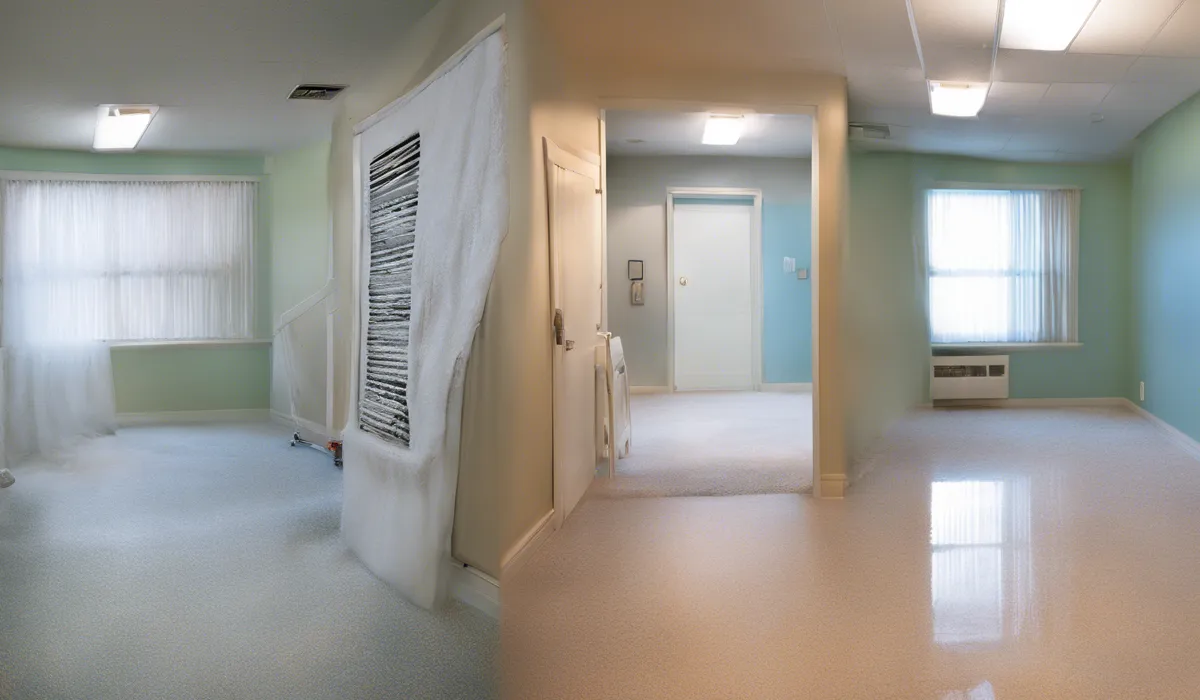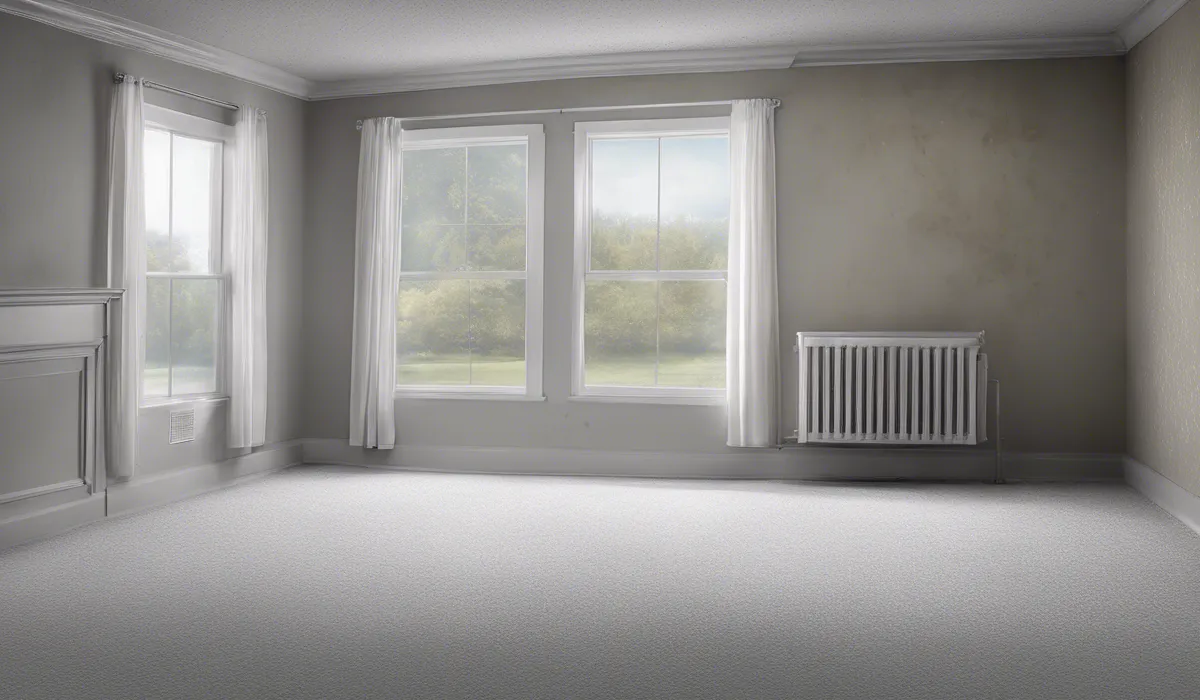HEPA filters can trap mold spores, removing them from the air. While they don’t kill mold, they effectively reduce airborne spore concentrations, aiding in mold allergy symptom relief and preventing spore spread.
Understanding HEPA Filters and Mold Removal

Definition of HEPA Filters
HEPA stands for High-Efficiency Particulate Air. A HEPA filter is a type of filter that can trap a large number of very small particles that other vacuum cleaners would simply recirculate back into the air of your home.
HEPA filters are made up of a mesh of randomly arranged fibers that trap particles of various sizes as they pass through. This makes them highly effective at purifying the air.
How HEPA Filters Work
HEPA filters work by forcing air through a fine mesh. This mesh traps harmful particles such as pollen, pet dander, dust mites, and tobacco smoke.
They have a complex web of fibers that capture particles through three primary mechanisms: interception, impaction, and diffusion.
As air flows through the filter, larger particles are captured by the fibers, while smaller ones get ensnared as they collide with gas molecules, aiding in air purification.
Types of Particles HEPA Filters Capture
HEPA filters are designed to capture particles as small as 0.3 microns with 99.97% efficiency.
They can trap common allergens and pollutants including dust, pollen, pet dander, and smoke particles. This makes them an invaluable tool for improving indoor air quality.
The Nature of Mold Spores Relative to HEPA Filter Capabilities
Mold spores are tiny, lightweight, and can easily become airborne. Most mold spores fall within the size range that HEPA filters can trap, which is about 10 to 30 microns.
Thus, HEPA filters are capable of capturing mold spores from the air and reducing their presence in indoor environments.
Limitations of HEPA Filters in Mold Removal
While HEPA filters can trap mold spores, they do not kill the mold. They also cannot remove mold that has settled on surfaces.
Additionally, if a filter is not changed regularly, it can become a breeding ground for mold, as the trapped moisture and organic material in the filter can provide an ideal environment for mold to grow.
The Effectiveness of HEPA Filters Against Mold

The Size of Mold Spores and HEPA Filtration Standards
Mold spores vary in size, but most are within the range of 10 to 30 microns.
Since HEPA filters are tested to trap 99.97% of particles that are 0.3 microns in diameter, they are more than capable of capturing mold spores effectively.
Laboratory Tests and Real-World Performance
Laboratory tests have shown that HEPA filters are highly efficient at capturing mold spores. However, real-world performance can vary.
Factors such as proper installation, the condition of the filter, and regular maintenance can all impact the effectiveness of a HEPA filter in a typical home or office setting.
HEPA Filters in Conjunction with Other Mold Remediation Strategies
For best results, HEPA filters should be used as part of a broader mold remediation strategy.
This includes identifying and addressing moisture problems, cleaning or removing mold-contaminated materials, and using HEPA vacuuming during cleanup processes.
Circumstances Where HEPA Filters Are Most and Least Effective
HEPA filters are most effective in enclosed spaces where they can cycle the air through the filter multiple times.
They are less effective in open or outdoor spaces where mold spores are constantly introduced into the environment.
The effectiveness also decreases if the filters are not maintained or replaced regularly.
Maintenance of HEPA Filters for Optimal Mold Spore Capture
Maintenance is crucial for HEPA filters to function correctly. Filters should be replaced according to the manufacturer’s guidelines, which is typically every 12 to 18 months for most residential units.
This ensures that the filter continues to capture mold spores effectively and does not become a source of contamination itself.
Additional Considerations When Dealing with Mold

The Importance of Addressing the Source of Mold Growth
Addressing the underlying cause of mold growth is essential. This often involves repairing leaks, improving ventilation, and eliminating sources of dampness.
Without tackling these issues, mold will continue to grow, and spores will continue to be released into the air.
Humidity Control and Mold Prevention
Controlling indoor humidity is one of the best ways to prevent mold growth. Keeping humidity levels below 50% will significantly reduce the likelihood of mold growth and the subsequent release of spores into the environment.
Integrated Approaches: Using HEPA Filters with Dehumidifiers and Air Purifiers
Using HEPA filters in conjunction with dehumidifiers and air purifiers provides a more comprehensive approach to mold remediation.
Dehumidifiers help maintain low humidity levels, which discourages mold growth, while air purifiers with HEPA filters remove spores from the air.
Professional Mold Remediation and Where It Fits with the Use of HEPA Filters
In cases of severe mold infestation, professional remediation may be necessary. Professionals use HEPA filters as part of their equipment to prevent the spread of spores during the cleanup process.
Once remediation is complete, maintaining a HEPA-filtered environment can help prevent the recurrence of mold problems.
Health Implications of Mold in Indoor Environments
Mold can have various health implications, especially for individuals with allergies or compromised immune systems.
By using HEPA filters, individuals can mitigate these risks by reducing the number of airborne spores, which in turn can help alleviate allergy symptoms and reduce the potential for mold-related health issues.
FAQs About HEPA Filters and Mold
Do HEPA filters capture mold spores from the air?
Yes, HEPA filters can trap mold spores, effectively removing them from the air you breathe.
Can HEPA filters help alleviate mold allergy symptoms?
Yes, HEPA filters reduce airborne mold spore concentrations, which can aid in relieving symptoms associated with mold allergies.
Do HEPA filters kill mold that they capture?
No, HEPA filters do not kill mold; they only trap mold spores to prevent them from circulating in the air.
Can using a HEPA filter prevent the spread of mold in my home?
Yes, by trapping mold spores, HEPA filters can help prevent the spread of mold in your home by reducing the number of spores that settle on surfaces and grow.
Is it enough to use a HEPA filter to control mold problems?
While a HEPA filter can reduce airborne spore counts, it is not a complete solution for mold problems. Addressing the source of moisture and mold growth is essential for full control.
Final Thoughts
HEPA filters are effective in trapping mold spores, significantly reducing their presence in the air.
While not destroying mold, these filters help alleviate allergy symptoms by lowering airborne spore counts and impeding the spread of spores, contributing to a cleaner indoor environment.
